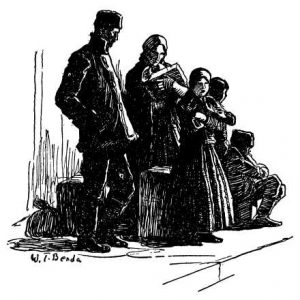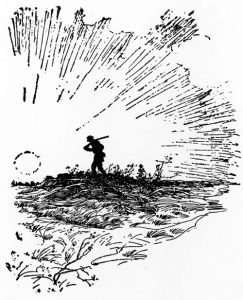Willa Cather is the quintessential novelist of the American prairie. That distinction comes to her first because she spent her formative years on the prairie in Red Cloud, Nebraska. Cather also paid homage to this landscape in many of her novels, most notably three early novels that comprise a “Prairie Trilogy.” First came O, Pioneers in 1913 and then Song of the Lark in 1915. In 1918 came what some consider Cather’s finest novel, My Àntonia. One hundred years ago Cather published a novel that captures both the promise and the tragedy of the American pioneering spirit and the yearning for progress. In this provocative novel Cather movingly tells the tale of immigrants and American transplants seeking a living and a life on the prairie. In the process she tells a tale of limits, place, and family.
The story is told from the perspective of Jim Burden. We first encounter a forty-year-old Jim in a short introduction written from the standpoint of an unnamed narrator. Jim and the narrator, both from Black Hawk, Nebraska (a thinly veiled fictionalization of Red Cloud), stumble upon each other while riding a train. We learn important facts about Jim in this brief introduction. Jim now lives in New York City, working for a large railroad interest. He is unhappily married to a wealthy socialite and is childless. Jim is also a romantic, who is able still, after all these years, to lose himself in the West. As Jim and the narrator reminisce about what it was to grow up in a small town, Jim decides to write down his memories, particularly of a young immigrant girl he befriended as a youth, Àntonia Shimerda. His story and hers are intimately intertwined. He first entitles his memoir “Àntonia.” He puzzles for a moment and adds one word, making it “My Àntonia.”
 From this moment the novel is Jim’s account of growing up in Black Hawk. Jim arrives as a young boy, an orphan from Virginia, to live with his grandparents. Through his experience in Nebraska Jim learns to love the land, the place, the people. This love is personified in his love for Àntonia, who arrives in Black Hawk on the same train as young Jim.
From this moment the novel is Jim’s account of growing up in Black Hawk. Jim arrives as a young boy, an orphan from Virginia, to live with his grandparents. Through his experience in Nebraska Jim learns to love the land, the place, the people. This love is personified in his love for Àntonia, who arrives in Black Hawk on the same train as young Jim.
The stories Jim reads on the train, in particular his reading of Swiss Family Robinson, direct the reader to think of pioneering peoples, making their lives out of harsh, unfriendly conditions. Yet this desire to build civilization is not a simple good, and Cather’s story warns readers regarding the potential ills of “progress.”
For example, contrary to the American fascination with money-making, Cather nearly always depicts commerce in a negative light in the novel. Two particular characters stand out: Peter Krajiek, who uses his knowledge of English to manipulate the immigrant Shimerdas to his own advantage, and Wick Cutter, described as a “merciless Black Hawk money lender” with an “evil name throughout the county.” Krajiek’s exploitation of the Shimerdas is so severe that it is a contributing factor to Mr. Shimerda’s eventual suicide. Cather compares Krakiek to a lazy snake that has gotten fat off of the innocence of prairie dogs. Cutter, as dissolute with women as he is with money, is a man who knows no limits.
Cutter is owed substantial funds by a pair of Russians, Peter and Pavel, whose story illustrates Cather’s condemnation of the selfish pursuit of wealth characterized by Krajiek and Cutter. Back in Russia Peter and Pavel had been part of a wedding, guiding one of a number of sleighs ferrying the wedding party through the snow. Set upon by wolves, one by one the sleighs topple, leaving the passengers to their doom. Peter and Pavel guide the last sleigh bearing the bride and groom. In their yearning for self-preservation they push the couple off the sleigh to lighten the load, literally throwing them to the wolves, allowing Peter and Pavel to escape. They date their many subsequent misfortunes from this event. Cather brackets this tale with tales of Wick Cutter’s greed, clearly prodding the reader to see the moral relevance of the wolf story.
Cather offers a critique of the kind of urban life that often follows from selfish ambition. This is portrayed in the story of Lena Lindgard, a vivacious young immigrant girl who longs to leave Black Hawk and pursue other more grand opportunities elsewhere. At first this is Lincoln, where she works in a dress shop and cultivates her love of cloths and fashion, a love, Cather suggests, that comes from having grown up wearing little more than rags. Lena eventually settles in San Francisco precisely so she can be anonymous and avoid any personal connections. It is no coincidence that of all the immigrant girls Lena is the least motherly, announcing that she has no desire to marry or have children, stating “I prefer to be foolish when I feel like it, and be accountable to nobody.” For Lena, having a family is “like being under somebody’s thumb.” She can’t get away from the farm fast enough.
What does Cather suggest instead of ambition and selfish business practices? One is the tie of place. As Jim prepares to go to college he walks in the Nebraska countryside and ponders, “For the first time it occurred to me that I would be homesick for that river after I left it. The sandbars, with their clean white beaches and their little groves of willows and cottonwood seedlings, were the sort of No Man’s Land, little newly created worlds, that belonged to the Black Hawk boys.” He stumbles upon Àntonia weeping by the river. She is homesick. She tells Jim of her hometown in Bohemia and her still vivid memory of it, declaring “I ain’t never forgot my own country.” She is convinced that a similar homesickness contributed to the death of her father. At college Jim reads the words of Virgil that serve as the novel’s epigraph, “Optima dies…prima fugit.” “The best days are the first to flee.” With these wistful words in mind, Jim is inspired, like Virgil, to “bring the Muse into my country.” Country in this context, Jim notes, is not a nation-state, but one’s local community. Twenty years later, Jim’s account of Àntonia is his attempt to finally do just this, to bring the Muse to his country.
Respect for place and people are presented in Cather’s positive portrayal of Jim’s neighbors, Mr. Harling and his daughter Frances. In contrast to other businesspeople, the Harlings take a personal interest in their clients, attending weddings and funerals, and gather an intimate knowledge of the lives and operations of local farmers. While gaining a certain degree of wealth from their business dealings, profit is secondary to the Harlings. They see their business as a kind of service and their customers as persons rather than mere customers.
Cather also suggests family as integral to a whole, happy, healthy life. When immigrant girls are discussing their large families and many siblings, one girl, Anna, says, “Yes, the babies came along pretty fast, to be sure. But I never minded. I was fond of them all. The youngest one, that we didn’t any of us want, is the one we love best now.” As noted, the novel makes subtle but unmistakable critiques of the ultimately childless Lena Lindgard.
Àntonia, as the titular character, should give us the clearest window into Cather’s definitive message. One must note that Jim also has no children. His marriage appears to be one of social and economic convenience. He gave up his dream of being a writer to become a lawyer instead, eventually working for large corporations that exploit places like Black Hawk for their own profit. He left Black Hawk for New York and does not return for two decades. He has travelled the globe and socialized with the world’s elite. In one sense he has the pioneering spirit, that spirit that is never at home with what is but instead is anxious to find what else could be.
Jim’s life stands in stark contrast to Àntonia’s. Àntonia never leaves Black Hawk. She is first engaged to a rascal named Larry Donovan who steals money from the railroad for which he works, leaves a pregnant Àntonia, and runs off to Mexico. Even though Àntonia’s own brother encourages her to kill her baby, she bears the child. Àntonia is described by one character as “a natural born mother.” She eventually marries a farmer and bears eleven more children. When Jim finally returns to Black Hawk and meets Àntonia, she is embarrassed to find out he has no children of his own. Her husband is not a talented farmer, but appears to be a pleasant, hardworking man who takes care of Àntonia and their many children. “His sociability is greater than acquisitive instinct,” we are informed. Àntonia no longer suffers from the bouts of depression that plagued her in her youth.
Making the best of our locale, trying to improve it, truly loving it and the people who are our neighbors, makes for a more fulfilled, contented life than one of rootless ambition.
My Àntonia is an antidote for much that ails the exhausted West. How is it that with our enormous wealth and comfort we are still unhappy, witnessed by the rising drug and suicide problems? Àntonia is not a self-creator, a cosmopolitan, a world-traveler, and she is quite poor. She ages before her time, taking on a haggard look, missing some of her teeth. But she is happy. With Àntonia as a model we can see that loving the place you are is essential to happiness. The vice of acedia is not just that of “sloth” as defined by laziness or lethargy, but that of being unable, in the words of Peter Lawler, to be at home with one’s homelessness. It is a kind of restlessness that Tocqueville put at the heart of the American condition. Flannery O’Connor opined that it is better to be someplace rather than no place. Making the best of our locale, trying to improve it, truly loving it and the people who are our neighbors, makes for a more fulfilled, contented life than one of rootless ambition.
Àntonia is not obsessed with material wealth. Her happiness comes from her children, her husband, and being in a place she loves. And of course it is precisely the giving herself over to family life that brings her so much joy. She does not live for herself, but for others. Jim’s admiration for her after all the years indicates Jim’s self-indictment. He has chosen poorly in life. He, with all his wealth, experience, and education is decidedly less happy than Àntonia. How similar is this to what we normally tell our young people, especially those in the ironically called “higher” education? Students are told that future career success is at the heart of their education. Delaying marriage and children to get a head start on a career is the practical move. For those of us who teach in the educational and social hinterlands, we regularly encounter the assumption that any student who sticks around after graduation is something of a failure. The successful students leave for the bigger cities, furthering the hollowing out of their hometowns. This is a tragic situation, in which the understandable desire for material success often conflicts with other deeper, more valuable accomplishments.
 Modern America faces the fundamental question that Cather’s story raised 100 years ago: are we willing to set aside part of our affluence in the name of more permanent things? The American experience contains a tragic contradiction: the very individualism, restlessness, desire for progress and material gain that have provided the impetus for so much of America’s financial might and the comfort that we most all enjoy attacks the foundations for a sound civil order, namely family, faith, and place.
Modern America faces the fundamental question that Cather’s story raised 100 years ago: are we willing to set aside part of our affluence in the name of more permanent things? The American experience contains a tragic contradiction: the very individualism, restlessness, desire for progress and material gain that have provided the impetus for so much of America’s financial might and the comfort that we most all enjoy attacks the foundations for a sound civil order, namely family, faith, and place.
I recall my first encounter with this splendid novel. I was a graduate student in Chicago. One summer morning I decided to read this novel that had been recommended to me. I had picked up a copy dirt cheap (thank you Dover Thrift Edition!). I started to read and within a handful of pages simply decided “This is what I am going to do today” and read the entire novel in one sitting (not a huge feat as it is relatively short). Cather laid the seed that would ultimately explain why this small-town Midwesterner felt so out of place in Chicago but so at home in places like St. Joseph, Minnesota, Laramie, Wyoming and Aberdeen, South Dakota. The novel was the beginning of a process of educating me out of an all-to-typical belief in the justice of economic efficiency, the human power of progress, and the divine right of individual choice.
Cather does this through evocative prose. Her ability to describe the rural landscape and, as in Tolkien, make it into another character is profoundly moving. The novel is not ingenuous regarding Àntonia’s life, but it is ultimately hopeful about the manner in which submission to limits and devotion to place and family can lead to happiness. In this increasingly centralized, bureaucratized, and even brutalized world, this message cannot be heard enough. That’s why I have been teaching My Àntonia in my American Political Thought classes for nearly twenty years.
My Àntonia is also notable for being the last of what we might call Cather’s optimistic prairie novels. She would not stop writing about small towns, but the First World War would dampen some of Cather’s literary buoyancy as evidenced by later novels set in small Midwestern towns, for example One of Ours, A Lost Lady, and Lucy Gayheart. None of these contain the hopefulness of her early works. Nevertheless, Cather did not lose all hope for a satisfying way of life, rooted in the land. Her post-war novels would also include, perhaps not coincidently, her two heavily Catholic influenced novels, Shadows on the Rock and Death Comes for the Archbishop, novels expressing more optimism than most of her other post-war work. Still, within Cather’s formidable corpus, My Àntonia stands out as a literary achievement and as a window into the tragedy of American progress.








2 comments
Comments are closed.